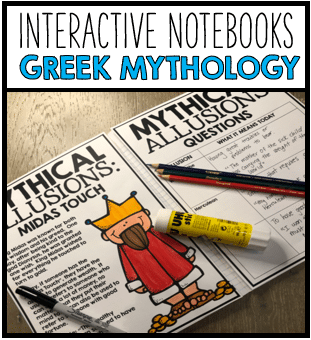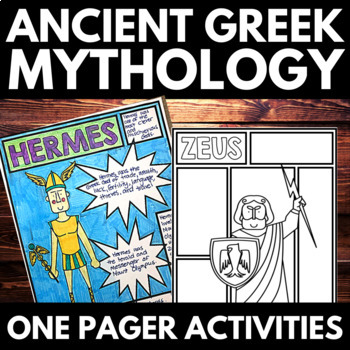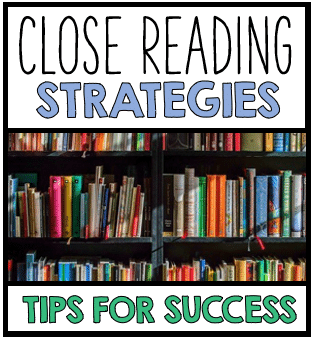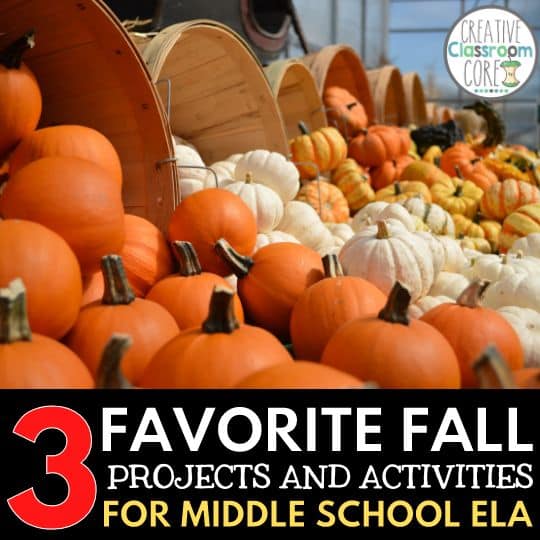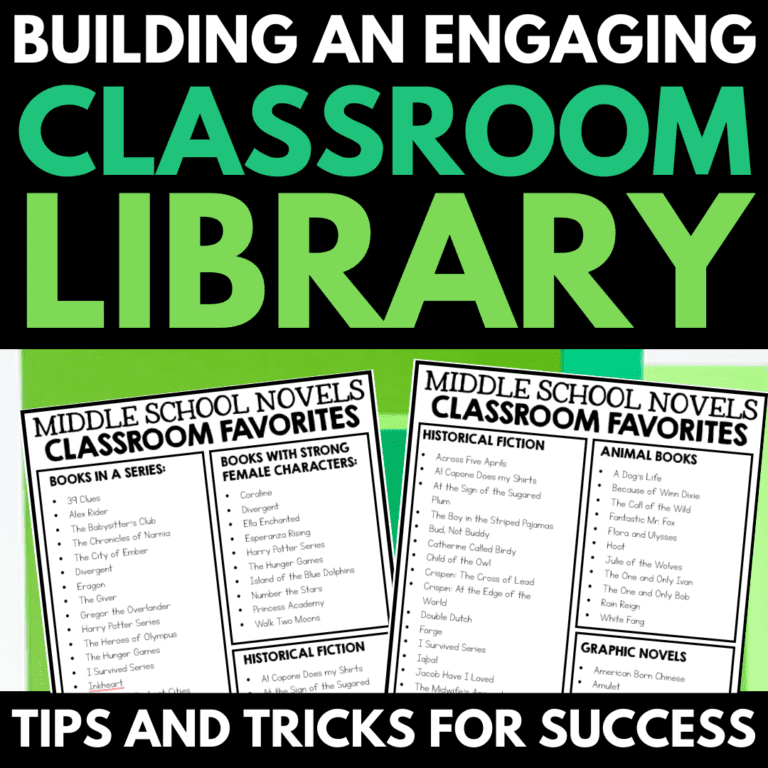Greek Mythology Activities
By MARISSA DESPINS Updated April 09, 2024
I am back with another fun post on Interactive Notebooks! In this post, I am excited to talk about another fun way to use Interactive Notebooks in your Social Studies classroom. In my previous posts, I talked about using Interactive Notebooks for different Ancient Civilizations. These included Mesopotamia, Greece, and Egypt. Today I am going to dive a little bit deeper into Ancient Greece, and focus specifically on Greek Mythology.
Greek Mythology has always been one of my favorite topics to teach. I fell in love with Greek Mythology in university. While there, I had an incredibly engaging professor would regale us with stories of the gods and goddesses. I love how they feel a bit like fairy tales. The magic and monsters make these stories super engaging for young (and old!) learners.
I have a wide variety of different ready to teach Greek Mythology activities available in my TPT shop that you can download and use right away – see them all by clicking on the button below!
(This post contain affiliate links which means I make a small commission if you make a purchase, at no additional cost to you. Thank you for your support!)
What are some fun ways to teach Greek Mythology?
Read on for a roundup of different ways to bring these engaging stories to life with your learners!
Videos for Teaching About Greek Mythology
Those of you who have been following me for a while, know that I am a huge fan of the Crash Course History series on YouTube. This series packs a lot of information into short clips. They also manage to keep things entertaining while still being really educational. This clip is a great one to start with. It introduces the concept of Mythology in a kid friendly way.
Another series I really love to show my students that relates to Greek Mythology is the Jim Henson “Storyteller” series. This is an old TV series from way back in the day. If you can get a hold of an old school DVD compellation, hold onto it like it is gold! Thankfully, you can also watch the individual episodes on YouTube. Each episode tells the story of a different Greek myth. I like to put these on after we read and do some activities with each myth. They make excellent review tools. The retellings of Orpheus and Eurydice and Daedalus and Icarus are definitely my favorites.
Word of warning, however. These are not your typical “Kermit the Frog” or “Muppet Show” type Jim Henson productions. These versions are much darker than your typical Jim Henson. You are going to want to make sure you watch them beforehand to make sure that they are not too scary if you have younger learners. I watch them every year with my middle school kiddos, with no issues whatsoever. I actually really like that they are less disney-fied than some of the other retellings out there. They manage to retain the magical creepiness of the original myths.
Greek Myth Read Alouds
Over the years, I have found that some of the Greek myths can be a bit complicated and have more complex vocabulary; reading the myths aloud the class provides access points for all learners, as students are actually able to comprehend text at a higher level than they can typically read. This is especially true for our younger and more vulnerable learners. I think reading aloud about the magic and wonder prevalent in these myths also helps build class community and provides excellent opportunities for class discussion. Also, reading and writing Greek Myths is a great way to tie some literacy into your Social Studies curriculum!

Some of my favourite read aloud collections include:
D’Aulaires Book of Greek Myths – If you purchase only one book to teach about Greek Mythology, let this be it. It has great images and text that is easily accessible to all learners. It is probably the most used mythology book that I have in my collection, and a class favorite for sure.
The Children’s Book of Myths and Legends – This one is worth the purchase simply for the gorgeous illustrations. It contains myths from around the world, so it is perfect if you are planning to teach about the gods and goddesses from different cultures.
The McElderry Book of Greek Myths – Another classic. This one has quick and engaging versions of pretty much all of the popular myths, and makes a fantastic read aloud. This one is great if you are wanting to teach mini units on some of the individual myths, as you can pick and choose the ones you want to include.
Mythlopedia – This is a series of mini reference books about the different gods, goddesses, and monsters of Ancient Greece. I love using these as reference tools for research on the characters.
Looking for ways to keep students accountable during your read aloud time? Check out our post on read aloud accountability!
Allusions from Greek Mythology
Mythical Allusions are words and phrases that many of your students will have heard and used in everyday life, often without knowing where they came from. When watching TV, they may have heard ads for Midas Tires. On Valentine’s day, they may have heard people talking about a friend being hit by “Cupid’s Arrow“. They may even own a pair of Nike shoes, or have a pack of Trident gum in their back pocket. Mythical Allusions are all around us!
An understanding of these allusions helps to give context. For example, when you know the story of Nike, you can better understand why a running shoe manufacturer would choose that name for their shoes. This short video clip does a great job of explaining allusions in a kid friendly way.
The resource below contains a variety of short reading passages explaining different allusions from Ancient Greece. Students can read the passages, fill in the fact gathering graphic organizer, and use the included templates to make a fun foldable for their Interactive Notebooks. You can snag a copy of this resource for yourself by clicking here, on the image below, or on the product cover at the bottom of this post.
To learn more about using allusions in your classroom, check out our post on mythical allusions to build vocabulary!
Greek Mythology One Pagers
If you have read my previous posts, you already know that I am a huge fan of One Pagers. They are a fantastic way to have students gather and present information in a way that is powerful and engaging.

I really like the versatility of One Pager projects, as they can be used in so many ways. I like to have my students use them as fact gathering templates to help them process and present information from reading passages and class notes.

Alternately, they work great for independent research projects. Students can research a god or goddess of their choice, and present the information they uncover in a One Pager format. One Pagers also make great review tools before a final assessment. If you are interested in trying out my collection of Greek Mythology One Pager templates with your class, you can click here, on the image below, or on the product cover at the bottom of this post.
I hope this post gives you some ideas to help you get started with teaching all about the gods, heroes, and monsters of Greek Mythology with your own class! Is Mythology a topic covered in your curriculum? Let me know about your experiences with teaching about Greek Mythology in the comment section – I am always looking to learn from you!
Looking for some of the resources mentioned in this post?
Click on the product covers below to go directly to the products in my Teachers Pay Teachers store.
Looking for more information on these resources?
Check out the video below for a detailed overview!
Looking for more information and FREE resources for teaching Ancient Greece?
Check out the related blog posts below!
Interactive Notebooks: Ancient Greece
9 Essential Topics for your next Ancient Greece Unit
History Stations: What are they and how can I use them in my classroom?
The Importance of Teaching About Ancient History
5 Tips for Engaging History Lessons
Interested in signing up for my email list?
If you are interested in signing up for my email list, you can do so by clicking on the link below. I periodically send out emails with free resources, teaching tips, and exclusive deals. Signing up will also give you immediate access to some of my best selling Interactive Notebook resources – foldables, graphic organizers, and other fun activities.
